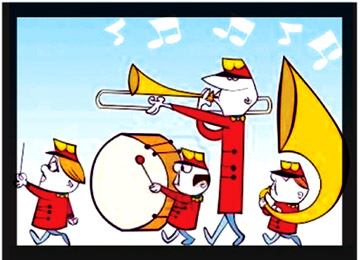Funeral bands - music to die for!
  Fame, that guerdon of high genius is an objective they will never
achieve. But in the spirit of characteristic bohemians they don’t give a
damn or rather a toot on their blaring brass tubas, trumpets, trombones
or tenor saxophones. Fame, that guerdon of high genius is an objective they will never
achieve. But in the spirit of characteristic bohemians they don’t give a
damn or rather a toot on their blaring brass tubas, trumpets, trombones
or tenor saxophones.
They appear to be a diminishing but not exactly extinct species,
these unique bands of musical men, many of them grizzled and down at the
heel, and the closest one could get to a quaint ragtime band.
Their very enthusiasm and ability to adapt resourcefully in any given
situation particularly in the sphere of ‘covering up’ their melodic faux
pas have astonished even the most discriminating music lovers. Indeed,
their aptitude for innovation would have made the legendary Satchmo
stare, gasp in bewilderment and would unquestionably have made that
celebrated satchel-mouth split into a huge, hearty grin.
All around the world there is nothing which so fires the imagination
and enthusiasm as a good parade. While not everyone can become
intimately involved in such grand events, the childhood dream of most to
march at the head of an ostentatious parade is within reach through the
brass band movement.
 So they are always at hand performing mostly for the lower
middle-class income groups, playing with dashing endurance for occasions
of both grief and joy. It was once a commonplace sight to observe these
bandsmen preceding funeral processions with a fairly good imitation of
the glide step or roll step of smart military bands. So they are always at hand performing mostly for the lower
middle-class income groups, playing with dashing endurance for occasions
of both grief and joy. It was once a commonplace sight to observe these
bandsmen preceding funeral processions with a fairly good imitation of
the glide step or roll step of smart military bands.
Unlike most martial marching bands whose music is produced at a
constant tempo in order to provide an unvarying beat for other military
units, the rag-timers are basically raggedy clusters. Usually with
prearranged purpose, military bands march forward only and in straight
lines. But the ragtime oldsters, given their fondness for the cup that
cheers, often make staggering curves in both their musical repertoire as
well as their stride.
Typically, each member tries to stay within his given rank and file
to maintain even spacing with neighboring musicians. But on one occasion
a snare drummer had bounced into the sax player consequently producing
an unstable ear-splitting squeak that had neither musical pulse nor sax
appeal.
The upshot of it all was that the latter began spewing out a barrage
of slanderous expletives against the offender’s ancestry. Along with
copious sprays of excess spittle he clearly intoned during the funeral
march that he would with different strokes, which could decidedly have
not been drumbeats, produce a unique colony of hybrid siblings to add to
the percussionist’s family.
Respect for human vanity is the orchestra’s official outfit. Their
white costumes are remarkably similar to the uniforms worn by the
Salvation Army bandsmen. But instead of the tunic-styled buttoned downed
tops of the former, they fancy quaint black bow-ties to provide
themselves a more formal sartorial appearance.
Peaked white caps adjusted at a rakish tilt complete the ensemble.
Yet there will always be at least three of them who are unable to find a
uniform that fits. Besides, many of their nether garments are sustained
by a suspensory belt or an old black necktie girded around their loins.
The favourite waterhole for many of the capital’s and suburbarban
northern-based bands was the toddy tavern under the Old Kelani Bridge
where they would imbibe profuse quantities of the ‘white champagne’
while watching the sand barges come to anchor while amusing themselves
as well as fellow tipplers with dirty ditties and their own Alcoholic
Bandsman’s Prayer which goes:
‘Our Lager,
Which art in barrels,
Hallowed by thy drink.
Thy Swill be drunk, (I will be drunk),
At home as it is in the pub.
Give us this day our foamy head,
And forgive those who spill against us.
And lead us not to incarceration,
But deliver us from hangovers.
For thine is the beer, the toddy, the Lager.
BARMEN.’
Everyone is aware that Sri Lankans love festivals. So parts of the
city become a glittering showcase set up during the season of goodwill
and into the New Year and well into the next years as well. Colombo has
always been a city ready to celebrate anything from funerals to weddings
and fund-raising fairs which are all charged with the excitement of a
carnival atmosphere.
That is where these middle-aged minstrels are much sought after to
perform the ‘tootooing’ on their horns accompanied by the tattooing drum
beats with no flagging or sense of fatigue.
Playing on the merry-go-rounds at carnivals they appear at their
dizzying, delirious peak filled with a wild exhilaration and an immense
sense of triumph. Theirs has always been an unmatched musical style
filled with full-flavoured vigour and originality. There suddenly
emerges the type of interplay between somewhat discordant Western
harmony and the ‘thammathattama’ percussion beat similar to ‘bera’ drums
that seemed to dovetail perfectly with the mourners’ head-banging
interspersed by loud sobbing and wailing.
A friend treasures an advertising leaflet compiled by one such
legendary bandleader which reads: “Dear Sir, I Fonny Fontaine Pingho and
band is willing to play for any occasion including carnivals, dancing
balls, and house parties. We are never late for any engagement, because
our punctuation is good. Our music is beyond your apprehension. We are
also playing for dead funerals, married weddings, at-homes, attainment
parties, marry-going-round etc.’
Still, Fonny and his merry musicians or their like could have given
the Dutch Swing College boys a run for their money on instant
improvisation bordering on the genius. For instance, when their
selection of dirges are exhausted during funeral processions, the leader
with positive daring blows out the evergreen ‘The Battle Hymn of the
Republic’ on a far slower than usual beat giving it a reverential
cadence. Such down to earth common sense has always been a feature of
these bandsmen.
The band’s kettle drummer, Percival Patrick sometimes doubled as
vocalist during this particular musical interpretation. Whenever he came
to the chorus he would mischievously substitute the lyrics ‘Glory, Glory
Allelulia’ to ‘Glory, Glory Allapang-Loola’ in a burst of sonorous glee
to the huge amusement of bystanders.
Percival (aptly nicknamed Percy-Vul and Vul Percy), also amended
other lyrics of the traditional hymn , ‘Gladly The Cross I’d Bear.’ to
“Gladly, the cross-eyed bear,” and Bob Dylan’s classic ballad ‘The
answer my friend is blowin’ in the wind’ to ‘Dead ants are in my pants;
they’re blowin’ in the wind.’
It was the sort of funeral pageant that gave one a tickle as well as
goose bumps. Their mournful melodies were certainly the type of music to
die for.
[email protected]
|





